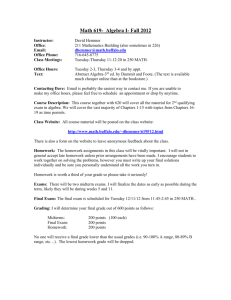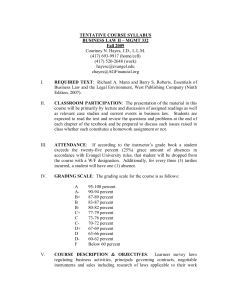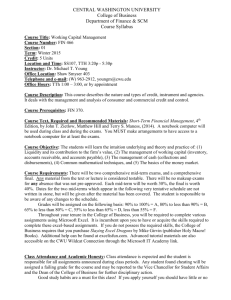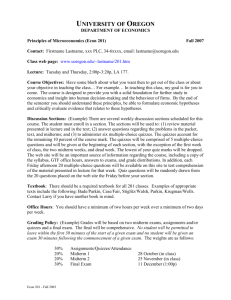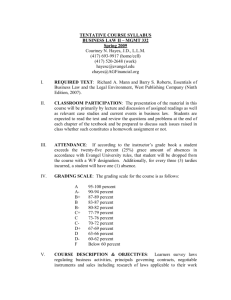COM 360-01. CRN - Mariusz Ozminkowski
advertisement
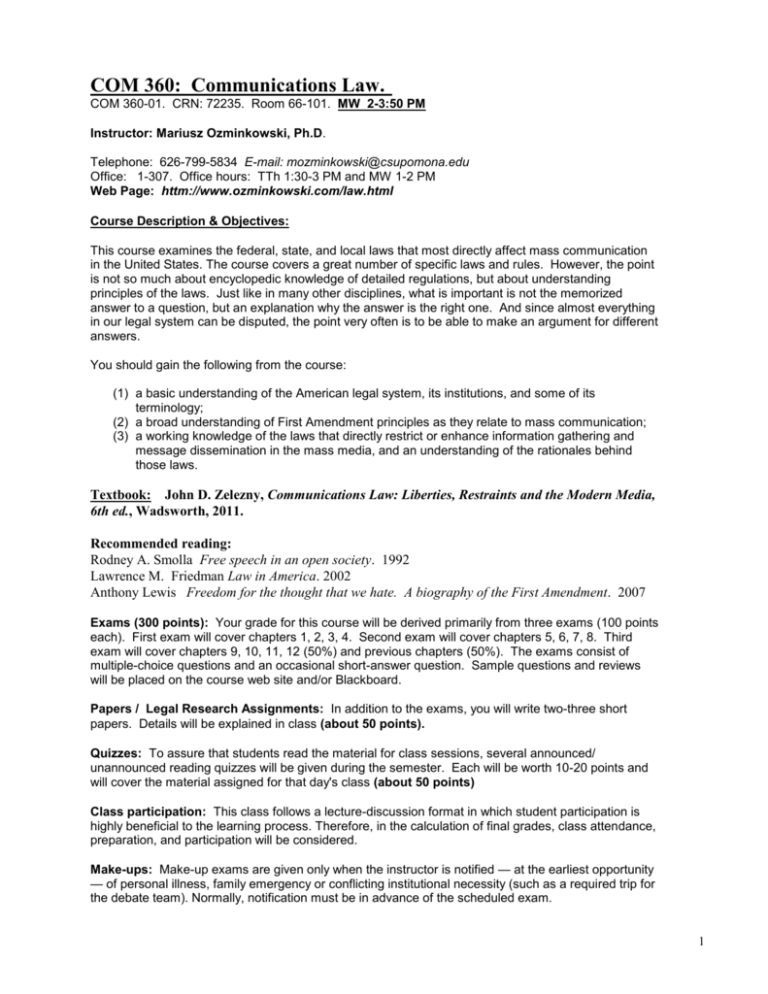
COM 360: Communications Law. COM 360-01. CRN: 72235. Room 66-101. MW 2-3:50 PM Instructor: Mariusz Ozminkowski, Ph.D. Telephone: 626-799-5834 E-mail: mozminkowski@csupomona.edu Office: 1-307. Office hours: TTh 1:30-3 PM and MW 1-2 PM Web Page: httm://www.ozminkowski.com/law.html Course Description & Objectives: This course examines the federal, state, and local laws that most directly affect mass communication in the United States. The course covers a great number of specific laws and rules. However, the point is not so much about encyclopedic knowledge of detailed regulations, but about understanding principles of the laws. Just like in many other disciplines, what is important is not the memorized answer to a question, but an explanation why the answer is the right one. And since almost everything in our legal system can be disputed, the point very often is to be able to make an argument for different answers. You should gain the following from the course: (1) a basic understanding of the American legal system, its institutions, and some of its terminology; (2) a broad understanding of First Amendment principles as they relate to mass communication; (3) a working knowledge of the laws that directly restrict or enhance information gathering and message dissemination in the mass media, and an understanding of the rationales behind those laws. Textbook: John D. Zelezny, Communications Law: Liberties, Restraints and the Modern Media, 6th ed., Wadsworth, 2011. Recommended reading: Rodney A. Smolla Free speech in an open society. 1992 Lawrence M. Friedman Law in America. 2002 Anthony Lewis Freedom for the thought that we hate. A biography of the First Amendment. 2007 Exams (300 points): Your grade for this course will be derived primarily from three exams (100 points each). First exam will cover chapters 1, 2, 3, 4. Second exam will cover chapters 5, 6, 7, 8. Third exam will cover chapters 9, 10, 11, 12 (50%) and previous chapters (50%). The exams consist of multiple-choice questions and an occasional short-answer question. Sample questions and reviews will be placed on the course web site and/or Blackboard. Papers / Legal Research Assignments: In addition to the exams, you will write two-three short papers. Details will be explained in class (about 50 points). Quizzes: To assure that students read the material for class sessions, several announced/ unannounced reading quizzes will be given during the semester. Each will be worth 10-20 points and will cover the material assigned for that day's class (about 50 points) Class participation: This class follows a lecture-discussion format in which student participation is highly beneficial to the learning process. Therefore, in the calculation of final grades, class attendance, preparation, and participation will be considered. Make-ups: Make-up exams are given only when the instructor is notified — at the earliest opportunity — of personal illness, family emergency or conflicting institutional necessity (such as a required trip for the debate team). Normally, notification must be in advance of the scheduled exam. 1 Final grades: Final grades will be based on your percentage of points out of the total, as follows: A = 100-94 percent, A- = 90-93, B+ = 89-87, B = 86-84, B- = 83-80, C+ = 79-77, C = 76-74, C- = 73-70, D+ = 69-67, D = 66-64, D- = 63-60, F = 59 and below. Study Tips: Most students find this course to be highly interesting and valuable. At the same time, law can be a formidable subject. Success in this course will require effortful thinking on your part, and memorization alone will be insufficient to meet the course objectives. Here are some suggestions: 1. Study your assigned readings prior to the class sessions at which they will be discussed. Make margin notations as you read, and be prepared to participate in class discussion. 2. Take thorough notes in class. Outline your notes and reading material prior to exams. 3. Form a serious study group with two or three other members of the class. Use your studygroup sessions to discuss hypothetical problem scenarios; this is a good way to pinpoint areas where you may need further study. COURSE SCHEDULE Week Dates Topics/assignments 1 MW 9/30, 10/2 2 MW 10/7, 9 3 MW 10/14, 16 Risks to Public Safety (Chapter 3) M 10/21 Damage to Reputation (Chapter 4) W 10/23 Examination No. 1: Chapters 1, 2, 3, 4 (Multiple-choice. Please bring a Scantron 882). 4 5 MW 10/28, 30 6 MW 11/4, 6 M 11/11 The U.S. Legal system (Chapter 1) The First Amendment (Chapter 2) Invasion of Privacy (Chapter 5) Access to Places and Information (Chapter 6) VETERANS DAY / CAMPUS CLOSED 7 W 11/13 8 MW 11/18, 20 M 11/25 9 W 11/27 10 MW 12/2, 4 11 Monday, December 9 1:40 PM Media and the Justice System (Chapter 7) Creative Property (Chapter 8) Examination No. 2: Chapters 5, 6, 7, 8 (Multiple-choice. Please bring a Scantron 882). The FCC and Broadcast Licensing (9) Electronic Media Content (10) Obscenity (Chapter 11) Commercial Speech (Chapter 12) FINAL. Exam No. 3: Chapters 9, 10, 11, 12 (50%) plus previous chapters (50%) Multiple-choice. Please bring a Scantron 882. 2
